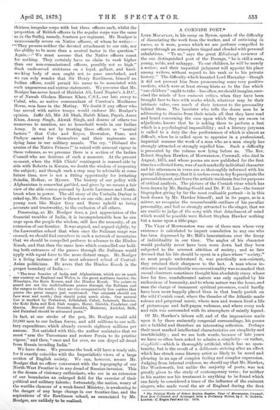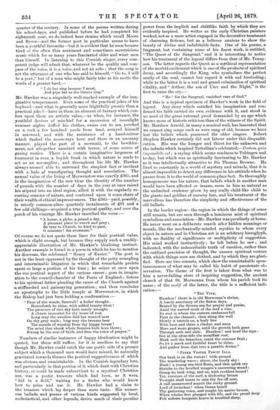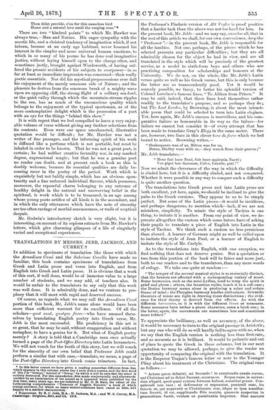A CORNISH POET.*
LORD MACAULAY, in his essay on Byron, speaks of the difficulty of dissociating the work from the worker, and of criticising in vacuo, as it were, poems which we are perforce compelled to survey through an atmosphere tinged and clouded with personal exhalations. "To us," says the great Edinburgh reviewer of the one distinguished poet of the Peerage, " he is still a man, young, noble, and unhappy. To our children, he will be merely a writer ; and their impartial judgment will appoint his place among writers, without regard to his rank or to his private history." The difficulty which haunted Lord Macaulay—though it did not prevent him from pronouncing some very positive verdicts, which were at least strong hints as to the line which "our children" ought to take—has often, we should imagine, exer- cised the minds of less eminent critics, when they have been brought face to face with works which, whatever may be their intrinsic value, owe much of their interest to the personality behind them. The barrister who tells the dozen men he is addressing to dismiss from their minds all that they have read and heard concerning the case upon which they are sworn to• adjudicate, knows that he is asking them to perform a feat which is a psychological impossibility ; and a literary juryman is called to a duty the due performance of which is almost as difficult, when he is called upon to appraise in a professional, impartial manner the work of a man who as a man simply has strongly attracted or strongly repelled him. Such a difficulty is presented by the volume now lying before us. The Rev. Robert Stephen Hawker, of Morwenstow, Cornwall, who died in August, 1875, and whose poems are now published for the first time in a collected form, was of such markedly individual character and his utterances in verse are so thoroughly informed with his special idiosyncrasy, that it is useless even to try fo precipitate the personal element, and leave the artistic residuum free for purposes of critical analysis. The picture of the Cornish vicar which has been drawn by Mr. Baring-Gould and Dr. F. G. Lee—the former biographer giving by far the most realisable portrait—is in this book drawn by Mr. Hawker himself ; and in its pages, as in a mirror, we recognise the rememberable outlines of his peculiar personality, and feel so strongly attracted to the singer, that we are unable to judge of the song with that detachment of mind which would be possible were Robert Stephen Hawker nothing but a name upon a title-page.
The Vicar of Morwenstow was one of those men whose very existence is calculated to impart consolation to any one who has been depressed by Mr. Mill's lamentations over the decay of individuality in our time. The angles of his character would probably never have been worn down had they been subjected to the severest attrition of society; and as fate decreed that his life should be spent in a place where " society," as most people understand it, was practically non-existent, they retained their sharpness to the last. A man whose in- stinctive and ineradicable unconventionality was so marked that casual observers sometimes thought him absolutely crazy, whose love for free, unadulterated nature was only equalled by his enthusiasm of humanity, and to whom nature was the home, and man the charge of immanent spiritual presences, could hardly have been more happily placed than in that lonely parish on the wild Cornish coast, where the thunder of the Atlantic made solemn and perpetual music, where men and women lived a life of picturesque and half-pagan rudeness, and where every rock and ruin was surrounded with its atmosphere of saintly legend.
Of Mr. Hawker's inborn self, and of the impressions made upon it by these eminently congenial surroundings, his poems. are a faithful and therefore an interesting reflection. Perhaps their most marked intellectual characteristics are simplicity and inartificiality ; and we use both words, because of late years we have so often been asked to admire a simplicity—or rather, simpiicitj—which is thoroughly artificial, which has no spon- taneity, but is the result of a deliberate striving after an effect which has struck some literary artist as likely to be novel and pleasing in an age of complex feeling and complex expression. Judging from internal evidence, we should say that Mr. Hawker, like Wordsworth, but unlike the majority of poets; was not greatly given to the study of contemporary verse ; for neither in his matter nor his treatment is anything to be found which can fairly be considered a trace of the influence of the eminent singers, who made vocal the air of England during the first
• The Political Works of Robert Stephen Hawker, Vicar 'f Morwenstow, Cornwall. Now first Collected and Arranged. with a Prefatory Notice, by J. G. Godwin. London: 0. Began Paul and Co. 1879.
quarter of the century. In some of the poems written during his school-days, and published before he had completed his eighteenth year, we do indeed hear strains which 'recall Moore and Byron—and the former poet in particular seems to have
been a youthful favourite—but it is evident that he. soon became
tired of the often thin sentiment and sometimes meretricious music which for so many years fascinated older and wiser men than himself. In listening to this Cornish singer, every com- petent judge will admit that, whatever be the quality and com- pass of the voice, it is a voice, and not an echo ; that the song is not the utterance of one who has said to himself, " Go to, I will be a poet," but of a man who might fairly take as his motto the words of a greater bard,-
" I do but sing because I must, And pipe but as the linnets sing."
Mr. Hawker was a singularly well-marked example of the ima- ginative temperament. Even some of the practical jokes of his boyhood—and what is generally more frightfully prosaic than a practical joke ?—have in them an element of fantasy which con- fers upon them an artistic value,—as when, for instance, the youthful deviser of mischief for a succession of moonlight summer nights doffed his clothes, swam out to sea, perched on a rock a few hundred yards from land, arrayed himself in sea-weed, and with the assistance of a hand-mirror which flashed the moon-rays here and there in an uncanny manner, played the part of a mermaid, to the bewilder- ment, not altogether unmixed with terror, of some scores of gazing rustics. There is a certain imaginative largeness of treatment in even a boyish freak in which nature is made to act as an accomplice ; and throughout his life Mr. Hawker -always seemed able to surround the simplest fact or incident with a halo of transfiguring thought and association. The annual value of the living of Morwenstow was exactly L'365, and
in the imagination of the new vicar the identity of the number of pounds with the number of days in the year at once raised his stipend into an ideal region, allied it with the regularly re-
curring seasons of nature, and conferred upon it some share of their wealth of ethical impressiveness. The £365—paid, possibly, in utterly common-place quarterly instalments of £91 and a few odd shillings—acquired a true poetical quality, and over the porch of his vicarage Mr. Hawker inscribed the verse :—
" A house, a glebe, a pound a day, A pleasant place to watch and pray ; Be true to Church, be kind to poor, 0 minister ! for evermore."
'Of course we do not quote these lines for their poetical value, which is slight enough, but because they supply such a readily- .appreciable illustration of Mr. Hawker's idealising instinct. Another example is found in a poem in which he has to mention his diocesan, the celebrated " Henry of Exeter." The poet is not in the least oppressed by the thought of the petty wrangling and interminable litigation in which that remarkable prelate spent so large a portion of his time ; he seizes at once upon the one poetical aspect of the curious career ; goes in imagin- ation to the council-chamber of the Peers of England ; listens to his spiritual father pleading the cause of the Church against a stiffnecked and gainsaying generation ; and thus concludes an apostrophe to the little temple at Morwenstow, in which the Bishop had just been holding a confirmation :- " Pane of the woods, farewell ! a holier thought.
Henceforth be thine, with added beauty blest !
The presence of this day hath surely wrought A charm immortal for thy home of rest.
Long may the swallow find her wonted nest On thy grey walls ; long may the breezes bear The sounds of worship from thy happy breast !
The mind that shook whole Senates hath been there; Strong be the soul of faith, and firm the voice of prayer."
Numbers of similar instances of happy idealisation might be quoted, but these will suffice, for it is needless to say that though Mr. Hawker could catch the one poetic side of a prosaic subject which a thousand men would have missed, he naturally gravitated towards themes the poetical suggestiveness of which was obvious and unmistakable. In the Cornish legendary lore, and particularly in that portion of it which dealt with Christian history, or could be made subservient to a mystical Christian use, was a poetic treasure which had been, as it were, " hid in a field," waiting for a finder who would know how to prize and use it. Mr. Hawker had a claim to the treasure which lay deeper than mere taste. His numer- ous ballads and poems of various kinds suggested by local, ecclesiastical, and other legends, derive much of their peculiar
power from the implicit and childlike faith by which they are evidently inspired. He writes as the early Christian painters worked, not as a mere artist engaged in the decorative treatment of charming fictions, but as a believer anxious to show the beauty of divine and indubitable facts. One of his poems, a fragment, but containing some of his finest work, is entitled, "The Quest of the Sangraal," and it is interesting to notice how his treatment of the legend differs from that of Mr. Tenny- son. The latter regards the Quest as a mythical representation of the morbid excitement which is one of the products of spiritual decay, and accordingly the King, who symbolises the perfect sanity of the soul, cannot but regard it with sad foreboding; while to the latter it is a real and grand culmination of spiritual vitality, and "Arthur, the son of Uter and the Night," is the first to raise the cry,- " Ho ! for the Sangraal, vanished vase of God."
And this is a typical specimen of Hawker's work in the field of legend. Any story which satisfied his imagination and con- firmed his faith carried its own evidence with it, and stood in no need of the gross external proof demanded by an age which knows more of historic criticism than of the witness of the Spirit. Mr. Matthew Arnold, in many a musical wail, has lamented that we cannot sing songs such as were sung of old, because we have lost the beliefs which possessed the older singers. Robert Stephen Hawker certainly did not labour under this disqualifi- cation. His was the hunger and thirst for the unknown and the infinite which inspired Tertullian's celebrated,—Certum quia impossibile est ; a saying which seems madness to Tubingen and to-day, but which was as spiritually fascinating to Mr. Hawker as it was intellectually attractive to Sir Thomas Browne. He lived so constantly in a world of mystery and miracle, that it is almost impossible to detect any difference in his attitude when he passes from it to the world of common-place fact. So thoroughly homogeneous was his nature, that beliefs which in another man would have been affected or insane, seem in him as natural as the unlimited credence given by any really child-like child to the giants and goblins of nursery lore, and his treatment of the marvellous has therefore the simplicity and effectiveness of the old ballads.
In the border region—the region in which the things of sense still remain, but are seen through a luminous mist of spiritual symbolism and association—Mr. Hawker was peculiarly at home. He never went on a deliberate search after hidden meanings or morals, like the mechanically-minded mystics to whom every object in nature and in Christian art is an arbitrary hieroglyph, with no fluidity of significance or multiplicity of suggestion. His mind worked instinctively ; he felt before he saw ; and indicated, with the indescribable truth of emotion, rather than the outlined precision of thought, the unseen spiritual vesture with which things seen are clothed, and by which they are glori- fied. Here are two sonnets, which show the unmistakable spon- taneousness of what may be called his habit of passionate ob- servation. The theme of the first is taken from what was to him a never-failing store of inspiring suggestion, the ancient church of that St. Morwenna from whom his parish took its name ; of the motif of the latter, the title is a sufficient indi- cation:—
" Taz VINE.
Hearken ! there is in old Morwenna's shrine,
A lonely sanctuary of the Saxon days,
Reared by the Severn sea for prayer and praise, Amid the carved work of the roof a vine.
Its root is where the eastern sunbeams fall First in the chancel ; then along the wall Slowly it travels on, a leafy line With here and there a cluster, and anon More and more grapes, until the growth bath gone Through arch and aisle. Hearken ! and heed the sign : See at the altar-side the steadfast root, Mark well the branches, count the summer fruit ; So let a meek and faithful heart be thine, And gather from that tree a parable divine."
"PATER 'PESTER EMIT ILLA.
Our bark is on the waters! wide around The wandering wave ; above, the lonely sky : Hush ! a young sea-bird floats, and that quick cry Shrieks to the levelled weapon's answering sound : Grasp its lank wing, and on, with reckless bound!
Yet, creature of the surf, a sheltering breast
To-night shall haunt in vain thy far-off nest, A call unanswered search the rocky ground.
Lord of leviathan ! when Ocean heard Thy gathering voice, and sought his native breeze, When whales first plunged with life, and the proud deep Felt unborn tempests heave in troubled sleep, Thon didat provide, e'en for this nameless bird Home and a natural love amid the surging seas."*
There are two " kindred points " to which Mr. Hawker was always true,—Man and Nature. His eager sympathy with the ascetic life, and a cloistral tendency of imagination which, if not inborn, became at an early age habitual, never lessened his interest in the simpler and more universal human emotions, to which in so many of his poems he has done real imaginative justice, without laying himself open to the charge often, and sometimes justly, brought against Wordsworth, of having suf- fered the prosaic accidents of his subjects to overpower—in so far at least as immediate impression was concerned—their really poetic essentials. Nor did his mystical prepossessions ever dull his enjoyment of the merely sensuous side of Nature ; and the pleasure he derives from the sonorous break of a mighty wave upon an opposing cliff, the strong flight of a solitary sea-fowl, or the quiet valley through which the mountain-stream ripples to the sea, has as much of the unconscious quality which belongs to the enjoyment of the typical sportsman, as of the more contemplative delight which is the possession of a poet with an eye for the things "behind this show."
It is with regret that we feel compelled to leave a very enjoy- able volume of verse without giving any further selections from its contents. Even were our space unexhausted, illustrative quotation would be difficult ; for Mr. Hawker was not a writer of fine passages, and the informing spirit of his work is diffused like a perfume which is not portable, but must be inhaled in order to be known. That he was not a great poet, is certain ; he had neither creative fecundity nor, in any marked degree, expressional magic ; but that he was a genuine poet no reader can doubt, and at present such a book as this is doubly welcome, because its essential qualities are daily be- coming rarer in the poetry of the period. Work which is exquisitely but not baldly simple, which has an obvious spon- taneity and a fine unforced individual flavour, which possesses, moreover, the reposeful charm belonging to any outcome of healthy delight in the natural and unswerving belief in the spiritual, is work which is to be treasured, in an age among whose young poets artifice of all kinds is in the ascendant, and in which the only utterances which have the note of sincerity are too often ravings of morbid sensuousness, or wails of sceptical despair.
Mr. Godwin's introductory sketch is very slight, but it is interesting, on account of its copious extracts from Mr. Hawker's letters, which give charming glimpses of a life of singularly varied and exceptional experiences.




































 Previous page
Previous page